
Get Instant Solution By an Expert Advisor
(4.8)
BIS Certification, issued by the Bureau of Indian Standards, ensures product quality and safety across ISI, CRS, FMCS, Hallmark, and other schemes. Explore BIS certificate types, documents, costs, validity, and renewal. Apply online with Agile Regulatory-India’s trusted BIS consultants for hassle-free certification and compliance support.


10000 +
Projects Completed for Our Respected Clients.
15 +
Years Experienced Advisors in Indian Compliance.
98.9%
Project Delivery Ratio for Our Valuable Clients.
99.9%
Satisfied Customers All Over India.
The process of getting a quality standard certificate for producing and selling different items in India from the Bureau of Indian Standards (BIS) is known as BIS Certification. Getting a BIS certificate is mostly optional, giving companies the choice to either obtain a certification or not. To guarantee adherence to Indian standards, the central government does, however, require obligatory certification for a few of the items.
Protecting the public, guaranteeing the safety of humans, animals, and plants, encouraging environmental conservation, stopping unfair commercial practices, and upholding national security are just a few of the significant objectives of BIS certification. The Bureau of Indian Standards, or BIS, is India's national standards body. It was created by the BIS Act of 2016. In certain situations, the Bureau of Indian Standards license or certificate of conformity issued by the central government is required to be used.
Under the Indian government's Ministry of Consumer Affairs, Food, and Public Distribution, the Bureau of Indian Standards is an Indian Standard Organisation. BIS bears the responsibility of guaranteeing end users the quality, stability, and dependability of products. Numerous quality certificates have been issued in support of this, and the company is actively involved in controlling, grading, setting industry standards, and performing testing for items that are marketed and distributed in India.
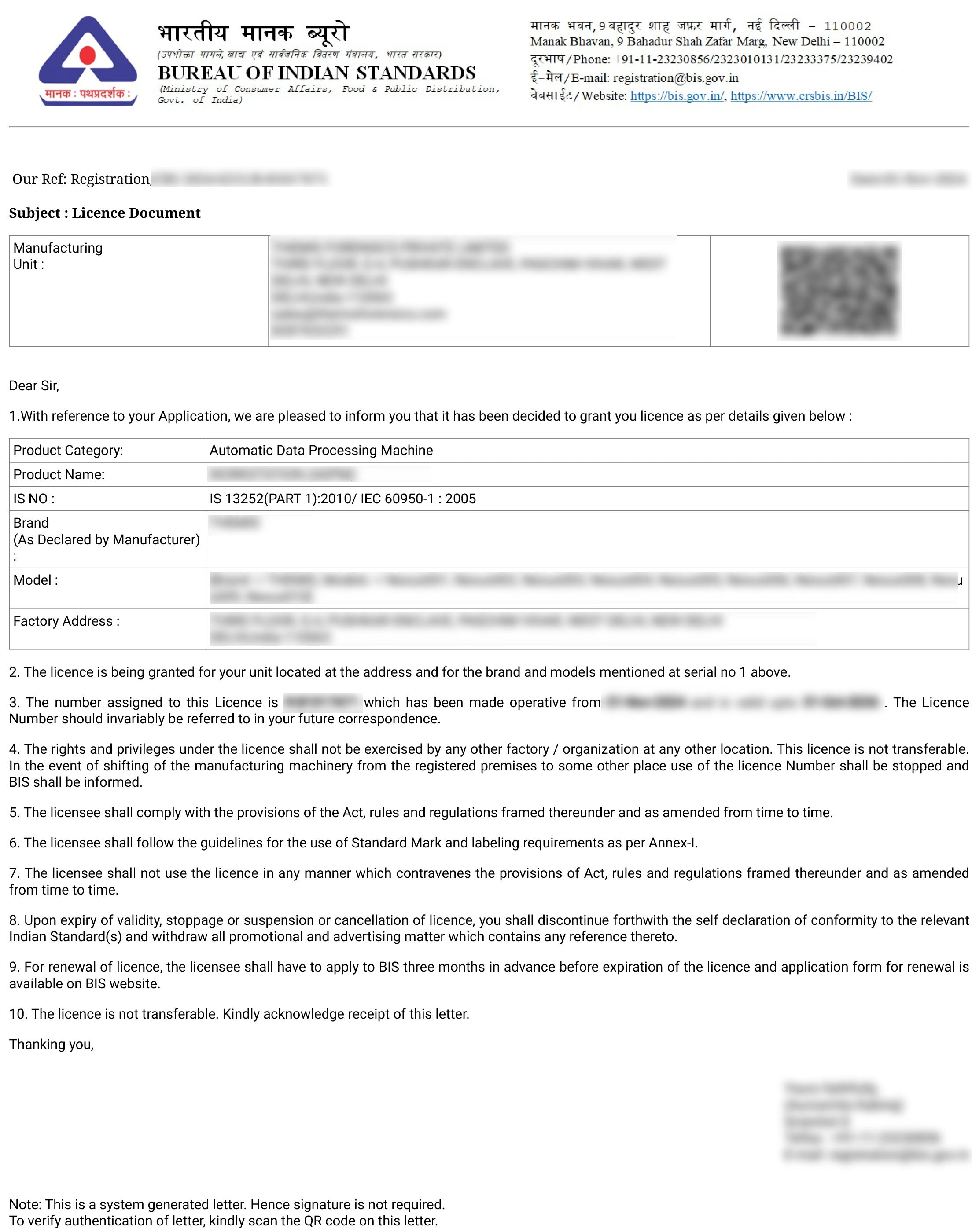
A statute that gave the Bureau of Indian Standards authority to provide manufacturers with a voluntary product certification program was enacted in 1986. With this certification, producers may use the standard mark as a way to demonstrate their commitment to the established quality standards and their product's conformity with Indian norms.
It is noteworthy that compliance with relevant Indian standards and the use of the standard mark are prerequisites for the domestic sale of BIS mandatory products. If these requirements are not met, the sale of such items within India is prohibited.
Below are the different types of BIS certification schemes:
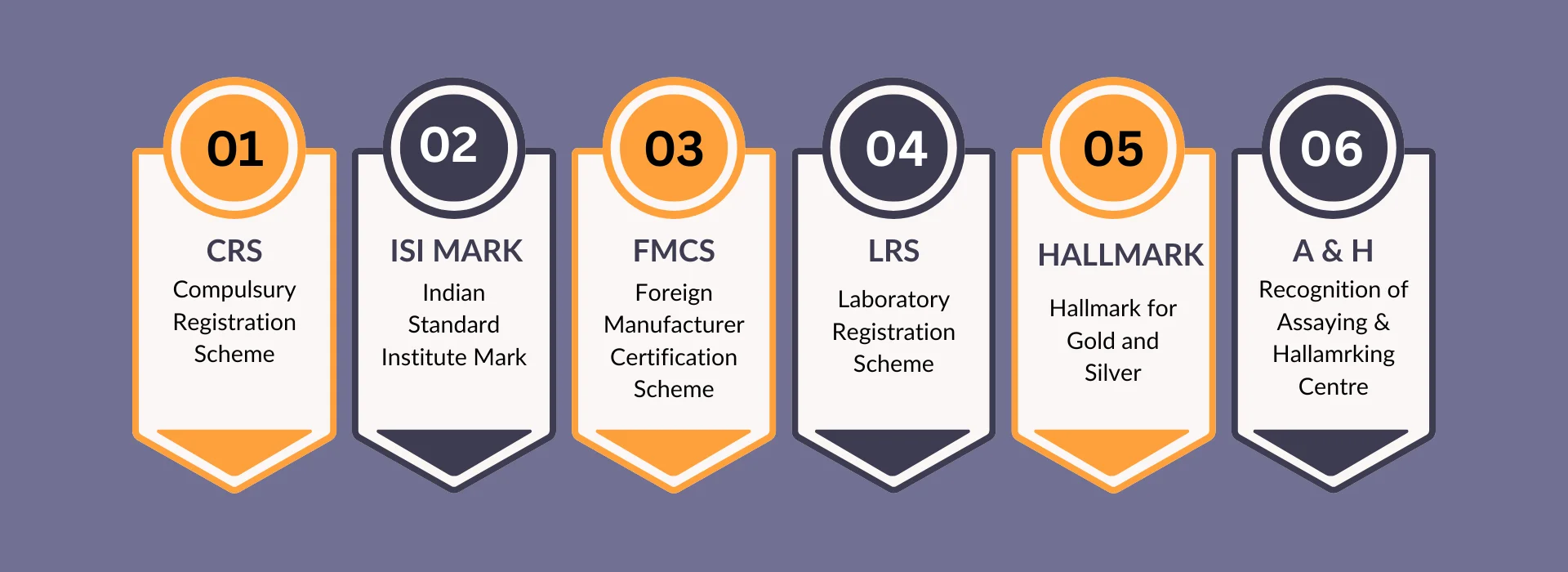
For the product categories that the Department of Electronics and Information Technology (MeitY) has announced, BIS also has a Compulsory Registration Scheme (CRS) for Electronics and Information Technology Goods. The Department of Electronics and Information Technology and the Bureau of Indian Standards launched this program in 2012 to protect Indian customers against counterfeit and subpar products.
No one is allowed to produce, store for sale, import, sell, or distribute items that do not meet the Indian standards outlined in the order and do not bear the Standard Mark, which is a unique registration number acquired from BIS in accordance with Compulsory Registration Scheme Orders. A BIS certificate is required prior to the release of information technology and electronic products into the market. After having their product evaluated in a laboratory certified by the Bureau of Indian Standards, manufacturers of goods covered by the compulsory registration scheme are required to apply for BIS certificates.
The Bureau of Indian Standards grants the ISI Mark Certificate, a standard mark. When a product bears the ISI mark, it guarantees that it complies with relevant Indian standards. For purchasers, the ISI label is a sign of confidence. The maker must receive a BIS certification from the Bureau of Indian Standards in order to use the ISI Mark on the product. The producer must guarantee that their product complies with all relevant Indian requirements in order to obtain a certificate from the Bureau of Indian Standards. Only producers whose goods satisfy all applicable Indian requirements are granted BIS certification.
Under this program, foreign manufacturers are able to sell their goods in India while using the standard ISI mark on their goods. Under the FMCS Certification Scheme, foreign manufacturers that produce goods that meet applicable Indian standards are granted a BIS license by the Bureau of Indian Standards to use the ISI mark on their products. The only body qualified to provide manufacturing permits to foreign entities is the Foreign Manufacturer Certification Department (FMCD). Providing foreign producers with quality certificates is primarily done by BIS to guarantee that the public is receiving high-quality, risk-free products.
BIS launched a gold Hallmark Registration program in 2000 and a silver hallmarking program in 2005 to safeguard consumers from adulteration and require jewellers to uphold a legal level of purity. Hallmarking is the exact measurement and formal recording of the proportional amount of precious metal in precious metal objects. Consequently, a hallmark is an official mark used to guarantee the purity or fineness of precious metal products in many different nations.
It is required for jewellers to be registered with the BIS in order to produce or market gold or silver jewellery. Jewellers are granted registration by BIS to manufacture and sell hallmark jewellery as part of the hallmarking program. Jewellers can register with BIS for the designated area under the hallmarking process. Centres for hallmarking and assaying must also have BIS approval. For the purpose of assaying and hallmarking jewellery in compliance with ISO 15820:2009, the assaying and hallmarking centre must also be approved by BIS.
The Bureau of Indian Standards manages the ECO Mark Scheme, which identifies environmentally friendly products. This scheme covers a wide range of product categories, such as paints, food items, soaps, detergents, batteries, packaging materials, architectural paints, food additives, wood substitutes, cosmetics, aerosols, plastic products, textiles, leather, fire extinguishers, and coir products. When a product displays the ECO Logo alongside the ISI Mark, it means the product meets both quality standards and specific environmental criteria outlined in the relevant Indian Standard.
Implementing the scheme, which includes reiterating, suspending, and cancelling permits; conducting inspections; and gathering samples for examination of any commodity or substance to which the ECO Mark has been applied, is under the purview of BIS.
Below is the list of BIS certification mandatory products:
|
Laptop, Notebook, Tablets
|
Video Games
|
Plasma, LED, LCD TV
|
|
Microwave Ovens
|
Visual Display Monitor
|
Printer, Plotter
|
|
Scanner
|
Wireless Keyboard
|
Telephone
|
|
Amplifier
|
Music System
|
Electronic Clock
|
|
Automatic Data Processing
|
Set Top Box
|
Power Adapter
|
|
UPS
|
Passport Reader
|
Power Bank
|
|
LED Flood Light
|
Smart Card Reader
|
POS Machine
|
|
Cash Register
|
Mobile Phone
|
LED Luminaries
|
|
Inverter
|
Control Gear
|
LED Lamp
|
|
Copying Machine
|
CCTV Camera
|
Mail Processing Machine
|
|
Passport Reader
|
Solar Systems
|
Optical Disc Player
|
|
Batteries
|
Webcam
|
Microphone
|
|
Barcode Reader, Scanner
|
Smartwatch
|
Induction Stove
|
|
Cash Dispensing Machines
|
Wireless Headphones
|
USB Storage Devices
|
|
Switch Mode Power Supplies
|
Rice Cooker
|
Digital, Video Camera
|
|
Bluetooth Speaker
|
LED Flood Light
|
Power Bank
|
|
Domestic Gas Stoves
|
Cement
|
Household Electrical Item
|
|
Batteries
|
Food Products
|
Oil-pressure stoves
|
|
Automobile Accessories
|
Cylinder
|
Valves
|
|
Regulator
|
Medical Equipment
|
Steel and Iron Products
|
|
Electrical Motors
|
Electrical Transformers
|
Capacitors
|
|
Chemicals
|
Fertilizers
|
Aluminium Foil
|
|
Textiles
|
Kitchen Appliances
|
Water Heaters
|
|
Air Conditioner
|
Air Conditioner
|
Plugs and sockets
|
|
Rubber Hose for LPG
|
Transparent Float Glass
|
Pressure Cooker
|
|
Cables
|
Jute Bag
|
Water Treatment System
|
|
Sewing Machine
|
Flux-cored electrodes
|
Iron pipes
|
|
Refrigerator
|
Helmet
|
Automobile Wheel Rim
|
|
Press Tool Punches
|
Footwear
|
Cattle Feeds
|
|
Paper
|
Reflectors for Bicycles
|
Butterfly Valves
|
|
Woven Sacks
|
Safety Glass
|
Toys
|
The process of getting a BIS certificate depends upon multiple steps. An applicant can apply for BIS certification as mentioned below:
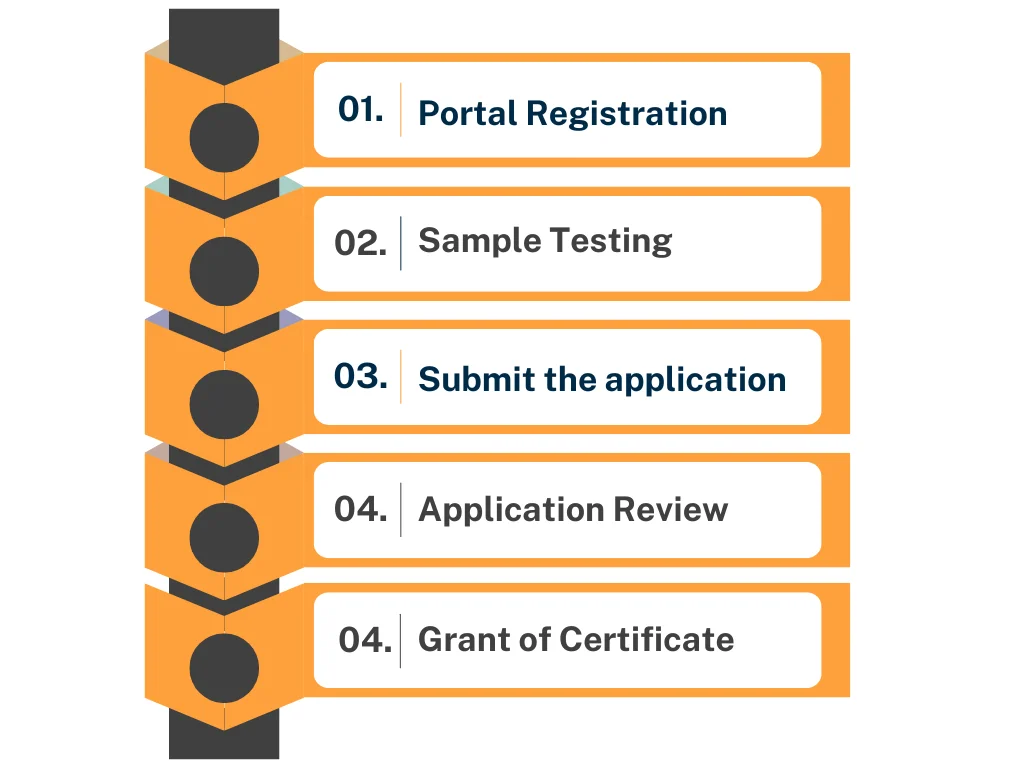
|
Scheme |
Timeframe |
|---|---|
|
ISI Mark Certification Scheme |
45-90 Days |
|
FMCS Certification Scheme |
120-180 Days |
|
CRS Certificate Scheme |
30-45 Days |
|
Hallmarking Scheme |
3-5 Days |
Note: Delays can occur due to incomplete documentation or failed testing, so it's advised to consult experienced professionals like Agile Regulatory.
BIS certification cost in India depends on the type of BIS certificate we are applying for:
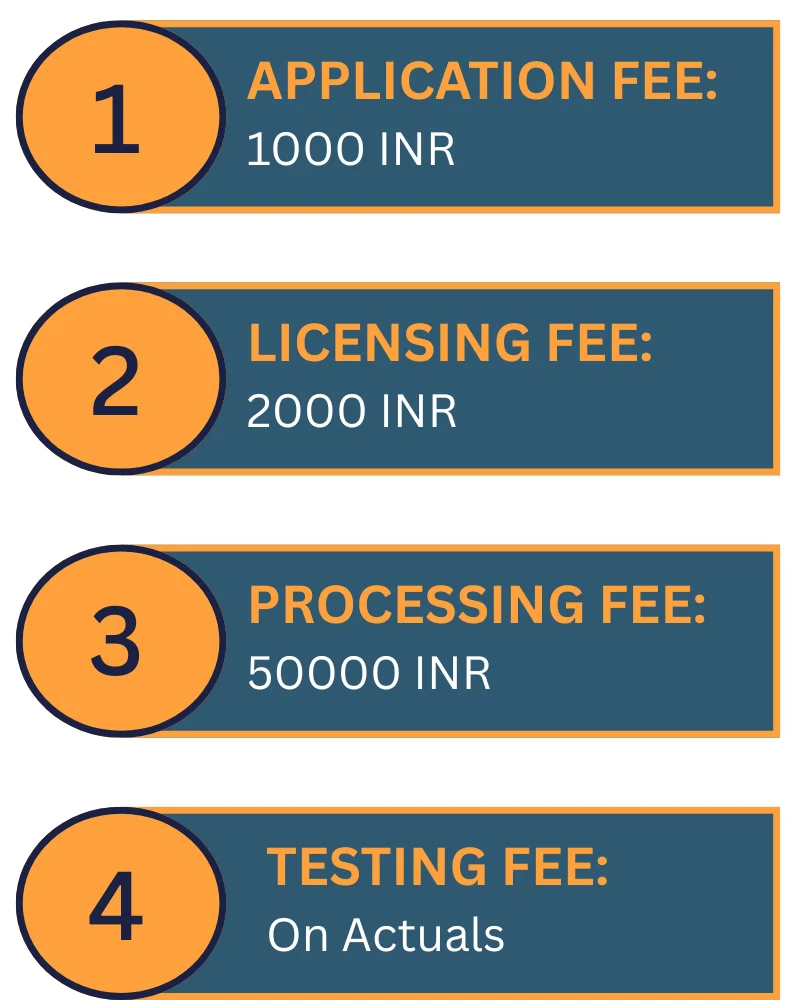 The fee structure for obtaining a BIS CRS certificate typically includes several components, like the application fee, which is non-refundable and has to be paid at the time of submitting the application. Testing Fee for testing of samples in a BIS-recognised lab. and processing fee for the grant of a BIS CRS certificate.
The fee structure for obtaining a BIS CRS certificate typically includes several components, like the application fee, which is non-refundable and has to be paid at the time of submitting the application. Testing Fee for testing of samples in a BIS-recognised lab. and processing fee for the grant of a BIS CRS certificate.
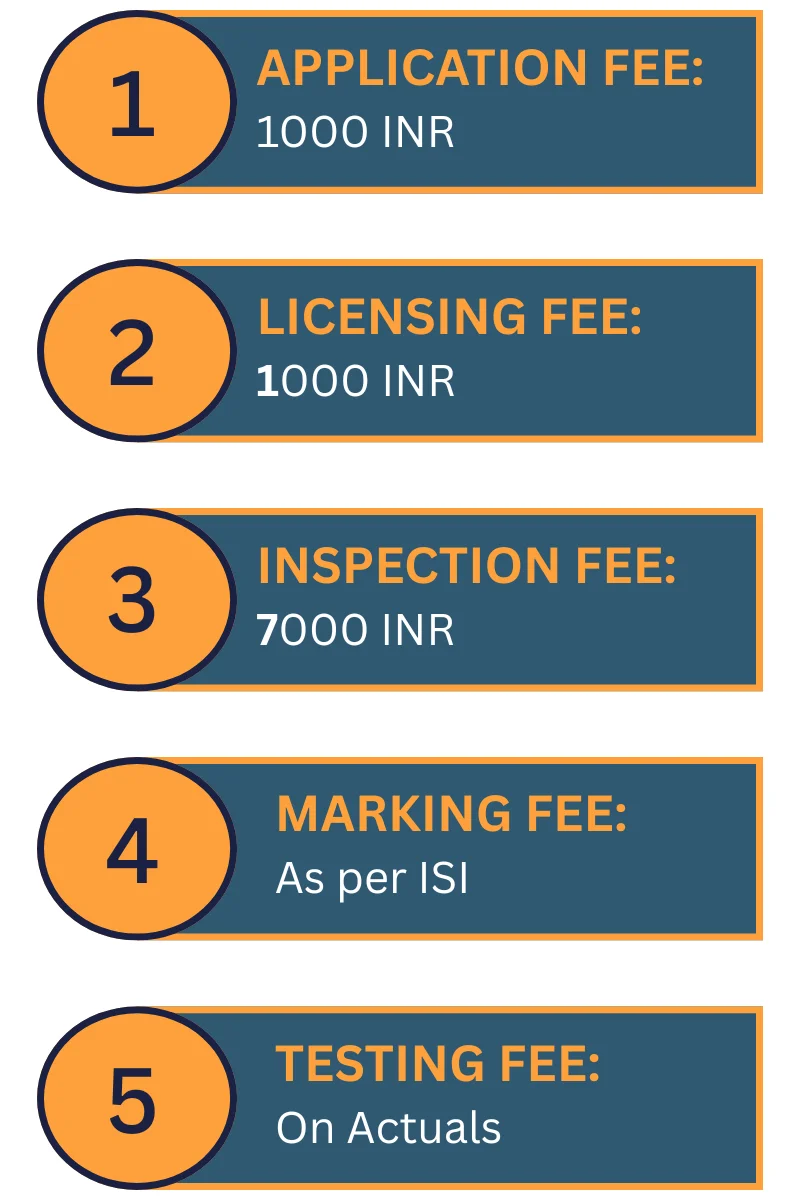 The fee structure for applying for an ISI mark certificate typically includes an application fee, which is paid at the time of submission. It also includes an audit or inspection fee that covers the cost of the initial audit and inspection of the manufacturing facility, a lab testing fee for testing product samples, a marking fee for the use of the ISI mark on products, and an annual license fee for maintaining the certification.
The fee structure for applying for an ISI mark certificate typically includes an application fee, which is paid at the time of submission. It also includes an audit or inspection fee that covers the cost of the initial audit and inspection of the manufacturing facility, a lab testing fee for testing product samples, a marking fee for the use of the ISI mark on products, and an annual license fee for maintaining the certification.
BIS certificates are valid for a period of 1 to 2 years. During this time, additional tests may be required to maintain the validity of the certificate. When it’s time for renewal, the certificate can be extended for 5 years. The renewal process involves submitting the application, paying the fee, reviewing the documents, and granting the renewal. The validity of the renewed BIS certificate ranges from a minimum of one year to a maximum of five years.
|
Challenge |
Solution |
|---|---|
|
Incorrect IS code selection |
Consult with Agile Regulatory BIS experts |
|
Rejected lab reports |
Agile Regulatory Use only BIS-recognized testing labs |
|
Delayed audits |
We schedule audit well in advance |
|
Incomplete paperwork |
Keep a checklist of all required documents |
To verify a BIS certificate:
|
Feature |
BIS Certificate |
ISO Certificate |
CE Mark |
|---|---|---|---|
|
Region |
India |
International |
Europe |
|
Focus |
Product safety |
Quality management systems |
Product compliance for EU |
|
Mandatory |
Yes for listed product |
No |
Yes for EU market |
|
Issuing Authority |
BIS India |
ISO-authorized bodies |
EU Notified Bodies |
Agile Regulatory is the India's most trusted bis consultant in India. The Bureau of Indian Standards certification is more than simply a logo; it represents the group's efforts to raise the bar for quality and win over customers. We understand the importance of Bureau of Indian Standards certification and help manufacturers ensure the quality of their products by easily getting a BIS certificate.
Our professionals have years of experience in the same industry and are skilled in the BIS Certificate process. Your products will meet all standards with our expert assistance, which will expedite the registration procedure and improve your brand's reputation for dependability and quality in the Indian market.

Get Instant Solution By an Expert Advisor
(4.8)
BIS Stands for Bureau of India Standard is a quality standard certification body that issues CRS (Compulsory Registration Scheme), ISI Mark Certificate, Hallmark Registration, ECO Mark, and FMCS Certificate to Manufacturers and importers of Various products like Electronics, IT, Telecom, textiles, chemicals, Medical Devices, steel & iron products, etc.
BIS certification is granted by the Bureau of Indian Standards in India. It serves as a mark of assurance from BIS, confirming that a product meets high standards of quality, reliability, and safety for customers.
BIS certification stands for Bureau of Indian Standards, ensuring products meet quality, safety, and performance standards in India.
Yes, it is mandatory. Because no one is eligible to import or sell a product in India without a BIS certification.
Below is the list:
Validity of BIS certification depends upon what certification scheme we are applying for. Like the BIS CRS Certificate is valid for two years, the ISI Mark certification is valid for one year, and the Hallmark registration is valid for a lifetime.
The procedure typically takes 30-45 days for BIS CRS, 45-90 days for the ISI Mark scheme, 120-180 days for the foreign manufacturer certification scheme, and 3-5 days for hallmark registration.
The process involves
To check the validity of a BIS certificate, you have to go to the Manak online portal and have to sign in by using valid login credentials.
A BIS certificate is required for importing products that fall under the mandatory BIS certification scheme in India. It ensures that the product is safe, reliable, and meets all the quality standards.
Prepare the necessary documents (technical specs, test reports), submit your application on the BIS portal, provide samples, pass testing, and await factory inspection approval
Log in to your BIS account on the portal. Once your certification is approved, you can download the soft copy of your BIS certificate directly from your dashboard.
Compulsory Registration Scheme, in short CRS, is a mandatory certification issued by BIS to the producer and importer of electronics, IT, telecom equipment, solar, and many more.
ISI, which stands for Indian Standards Institute, issued by BIS, is a quality certification applicable to domestic manufacturers, importers, and foreign manufacturers of various products like electrical, electronic, chemical, textile, footwear, garment, medical device, aluminium, steel, and iron.
BIS issues FMCS, the Foreign Manufacturer Certification Scheme, to foreign manufacturers of various products like electrical, electronic, chemical, textile, footwear, garment, medical device, aluminium, steel, and iron, etc., who want to launch their products into the Indian market.
BIS Hallmark Registration is required for jewellery shop owners of gold and silver.
Yes, LED lights come under the Scheme II Compulsory Registration Scheme of BIS as per IS 10322.
Yes, electric ceiling fans come under scheme I (ISI Mark Certification scheme). No one is eligible to manufacture or sell fans in India without an ISI mark.
A BIS certificate for a toy is mandatory for both electric and non-electric. Non-electric toys come under IS 9873 (Part 1): 2018, and electric toys come under IS 15644: 2006. To get a BIS for toys, you need to select the applicable standard, draft the forms and formats, send toys to a lab for testing, get a test report, and submit all documents along with the BIS fee receipt. After successful application verification and site audit, you will get a BIS certificate.
All products certified by the Bureau of Indian Standards must carry the appropriate BIS logo, based on the type of certification:
Proven 4-step Process: Consultation, Documentation, Submission, and Certification.
Startups to large enterprises, we deliver end-to-end solutions business compliance needs.

What our customer says about us
Fantastic support from the team. Their expertise transformed our approach, driving remarkable outcomes. A must-have partner for businesses seeking effective consulting solutions. Highly recommended.

Lavkush Sharma
KTPL Instruments
Agile Regualtory delivers exceptional solutions. Their insightful guidance streamlined our processes and boosted profitability. Highly recommended for businesses seeking expert consulting services to thrive.

Nitin Mukesh
Justrack IOT
Impressed by Agile Regulatory's expertise. Their strategic insights and practical solutions have elevated our business operations. A reliable partner for effective consulting services. Highly recommended for growth-focused businesses.

Pradeep Varma
Coaire Compressor
Extraordinary consulting services. Their insightful solutions and dedicated team reshaped our business, driving remarkable improvements. Highly recommend it for transformative results.

Bharat Bachwani
Easy Polymer
Incredible experience with Agile Regulatory. Their innovative strategies and expert advice revitalized our business model, resulting in impressive growth. Highly recommend their exceptional consulting services.

Atul Jain
Tarus International
Top-tier consulting! offered strategic solutions that revolutionized our approach. Their deep expertise and personalized guidance made a significant impact on our success. Highly recommend their services.

Paramjeet Singh
Anchor Weighing
Agile Regulatory exceeded expectations! Their tailored solutions, expertise, and proactive approach led to remarkable results. Highly recommend for businesses seeking impactful and strategic guidance.

Anshul Rathi
AM Capacitor
Outstanding service! delivered targeted solutions with professionalism and expertise. Their insights elevated our business strategies, resulting in noticeable growth. Highly recommended for exceptional consultation.

Shekhar Maurya
Imaxx Pro Aquistic